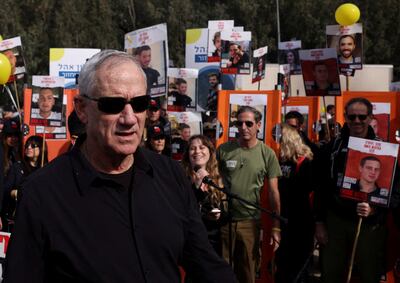Live updates: Follow the latest on Israel-Gaza
Israeli Prime Minister Benjamin Netanyahu has come under yet more political pressure this week after a key member of the country’s war cabinet called for elections in September.
Benny Gantz, one of Mr Netanyahu’s main rivals, on Wednesday evening said a vote was needed to “maintain unity” in Israel, where already fragile trust in the government has plummeted since October 7.
Tensions came to a head this week after four consecutive night-time protests in Jerusalem against the government, some of which descended into violence, with rage mounting in particular over accusations the government is not doing enough to rescue Israeli hostages in Gaza.
“With this government, we don’t see a future or day-after plans for the war,” said Lital Shochat, a representative of the protest movement.
“The only way for Israel as a country to move forward is by going to elections and giving the mandate back to the people who choose a government that is interested in more than just staying in office.”
Despite rising public pressure, Mr Netanyahu says he will stay in power to keep pursuing the campaign in Gaza until “total victory” and that elections would weaken Israel’s war effort.
The head of the country’s domestic intelligence service, the Shin Bet, condemned the violence in Jerusalem and said it represents “a worrying trend that could lead to dangerous places”.
But protest leaders say that anger will only dissipate with a change of government.
“What people fear most about a vote is the tension it would create among Israelis, but that’s happening already without elections. Anger won't stop until democracy provides a sufficient answer that says once and for all what the people need and want,” Ms Shochat said.
“It’s not going to be pleasant but it will not create more of what we are seeing today – it will put an end to it. The only way to heal this country is by forming a new government that has the trust of the majority of the people of Israel.”
Organisers behind the rallies hope they will open a chapter of mass anger that brings about the downfall of Mr Netanyahu’s government. They face a difficult challenge against a coalition whose far-right factions are determined to stay in power and make the most of an opportunity to change Israel radically.
But protest leaders received a boost when the families of hostages being held in Gaza called for Israelis to “take to the streets”, directly challenging the government over the most emotive current issue for Israelis: the plight of captives in Gaza.

Fears have also been rising this week that mass protests by ultra-Orthodox Israelis are on the horizon as the Netanyahu government struggles to contain a growing political and legal push to force young men in the isolated community to participate in national service conscription.
There is mounting fury among serving Israelis at the long-standing exemptions – particularly now the Gaza War is under way – which ultra-Orthodox leaders say are justified because full-time male Torah study protects Israel and shields the community’s men from secular influences to which they might be exposed in national service.
Army reservist protesters marched through the ultra-Orthodox Jerusalem neighbourhood of Mea Shearim this week, prompting angry scenes.
Ultra-Orthodox parties form a key bloc in the Netanyahu government and say any meaningful step towards drafting their young men is a red line.
Consistent low polling for key parties in the coalition in the event of an election has, however, led to commentators questioning the likelihood of far-right parties bringing down the administration, which fears a landslide victory for the opposition.


